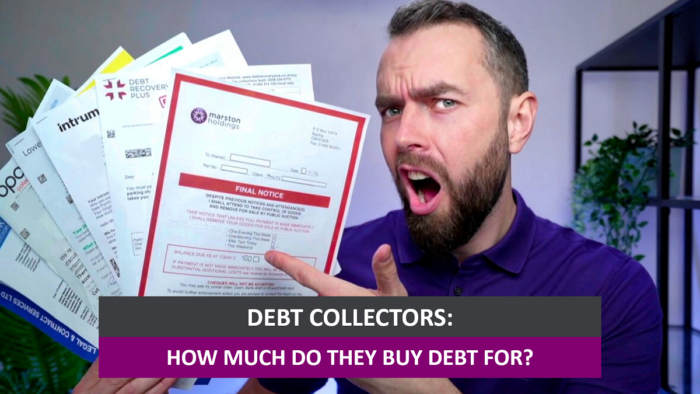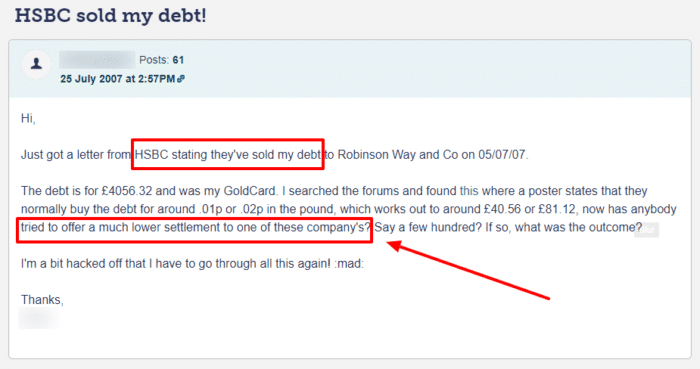How Much Do Debt Collectors Buy Debt for in the UK?
For free & impartial money advice you can visit MoneyHelper. We work with The Debt Advice Service who provide information about your options. This isn’t a full fact-find, some debt solutions may not be suitable in all circumstances, ongoing fees might apply & your credit rating may be affected.

For free & impartial money advice you can visit MoneyHelper. We work with The Debt Advice Service who provide information about your options. This isn’t a full fact-find, some debt solutions may not be suitable in all circumstances, ongoing fees might apply & your credit rating may be affected.
Have you received a surprising letter from a debt collector? You might be feeling confused and worried. This is quite common. In fact, research shows that 64% of UK adults find interactions with current debt collectors stressful1.
Don’t worry; you’ve come to the right place. Each month, over 170,000 people visit our website seeking advice on debt matters.
In this easy-to-read article, we will explain:
- How much debt collectors usually pay for debt.
- Why your creditor might have sold your debt.
- How to know if your debt has been sold.
- What happens if you don’t pay or can’t pay.
- How debt collectors might affect your credit score.
We know it’s not easy when a debt collector gets in touch; you may be questioning if you should pay or if it’s even real. Don’t worry; we’re here to share clear, simple facts to help you understand what’s happening.
Why Would My Creditor ‘Sell’ My Debt to an Agency? Do They Get More Money for it?
Debt collection agencies buy billions of debt annually at rock bottom prices, at an average of 10p to £1! 2. This means that the collector makes a profit by collecting all of your debt – their profit is the value of your debt minus the cost of debt purchase.
It is much easier for your creditor to sell your debt than it is for them to chase you for it. By selling it, they can still get some of their money back but don’t have to spend anything else on administration or even legal action against you.
How Will I Know if My Debt has been Sold to a Debt Collection Agency?

Keep in mind that they don’t have to agree and are legally entitled to chase you for the full debt amount. However, showing that you can quickly pay them most of the debt might be a good offer for them as they won’t have to spend a lot of money chasing you!
How a debt solution could help
Some debt solutions can:
- Stop nasty calls from creditors
- Freeze interest and charges
- Reduce your monthly payments
A few debt solutions can even result in writing off some of your debt.
Here’s an example:
Situation
| Monthly income | £2,504 |
| Monthly expenses | £2,345 |
| Total debt | £32,049 |
Monthly debt repayments
| Before | £587 |
| After | £158 |
£429 reduction in monthly payments
If you want to learn what debt solutions are available to you, click the button below to get started.
Do the Same Rules and Payment Agreements Apply?
» TAKE ACTION NOW: Fill out the short debt form
You also need to be realistic about your finances. While it is tempting to agree to higher payments so the debt goes away quickly, missing some payments because you can’t afford them is going to make things worse.
You can use one of our free letter templates to write to the debt collection agency and request lower payments or similar.
If you have a home visit from a debt collector, we don’t recommend paying them. If you do, it is essential that you ask for a receipt. This is because it is much easier to keep a record of all of your payments and, therefore, more difficult for them to argue with you about your debt down the line.
Keep in mind that most of this activity will be visible on your credit file.
Entries on your credit file are visible for 6 years. After this time, they are no longer present, and any credit agency will not be able to see them.
Your Rights With Debt Collectors
To help you better understand your rights when dealing with debt collectors, we’ve created this quick table. If you want to learn more about what they can and can’t do, make sure to check out our detailed guide.
| Debt Collectors Can | But They Can’t |
|---|---|
| Contact you by phone or mail. | Call you after 9pm or before 8am. |
| Conduct home visits (on rare occasions) and knock on your door. | Forbily enter your home, or stay if you ask them to leave. |
| Threaten to take you to court by suing you for payment on a debt. | Harrass you, including threats of violence, repeated calls and visits, or abusive language. |
| Negotiate a debt settlement. Tip: make sure to get this new arrangement in writing. | Visit your workplace. |
| Access your bank account, but only after a court judgment has been made. | Take anything from your home or threaten to do so. |
| Sell your debt. | Speak to other people about your debt without your permission. |
| Contact you frequently. | Keep doing so if you request that they reduce communications. |
Janine, our financial expert, explained that while debt collectors can visit your home for payments, they cannot come to your workplace, act threateningly, force payment, or discuss your finances with others. If they violate these rules, you can complain.
What if I Don’t Pay?
There are legal consequences of non-payment.
If you don’t pay the debt collection agency, even though they can prove you are liable for the debt, they may take legal action against you.
This will be a County Court Judgement (CCJ). A CCJ is a document from a judge that orders you to pay the debt. We recommend getting involved in this process so your circumstances can be taken into account. This could mean that you are given a payment plan to follow or the overall debt amount is lowered.
Keep in mind that a CCJ doesn’t come out of the blue. There are a minimum of two documents that need to be sent to you to give you the chance to pay the debt before you go to court. These are:
- Letter of claim: Your debt collection agency must try to reach a payment agreement with you first. This is a pre-action protocol for debt claims. They need to offer you several repayment options and give you 30 days to decide and contact them back.
- Default notice: If you haven’t reached a repayment agreement, your debt collection agency must now send a default notice. This is the final warning before legal action can begin.
Thousands have already tackled their debt
Every day our partners, The Debt Advice Service, help people find out whether they can lower their repayments and finally tackle or write off some of their debt.

Natasha
I’d recommend this firm to anyone struggling with debt – my mind has been put to rest, all is getting sorted.
Reviews shown are for The Debt Advice Service.
What if I Can’t Pay?
If you are unable to pay your unsecured debts, you may benefit from a debt solution.
There are several different debt solutions in the UK, and many will stop debt collectors from contacting you altogether.
Before you begin a debt solution, we recommend speaking to a debt charity. Their advisers will be able to provide debt counselling services and make sure that you opt for the best debt relief option for you. We have linked some charities that offer these financial services for free at the bottom of this page.
Debt Management Plan (DMP)
A DMP is an informal debt solution that lets you pay off your debts via a single monthly payment.
Because it is informal, it is not legally binding so you are not tied into a DMP for a minimum number of payments.
Individual Voluntary Arrangement (IVA)
An IVA is a formal agreement between you and your creditors. You agree to pay a monthly sum that is distributed amongst your debts, and your creditors agree not to contact you during your IVA.
IVAs typically last for 5 or 6 years, and any outstanding debt is wiped off when it ends.
Keep in mind that IVAs are not suitable for everyone. You need to owe several thousand pounds to more than one creditor to be eligible. You also need to demonstrate that you have some disposable income every month.
Trust Deed
IVAs are not available in Scotland. Instead, you will need to opt for a Trust Deed.
Trust Deeds work in the same way as an IVA – you pay an agreed sum each month that is shared amongst your creditors, they can’t contact you, and any leftover debt at the end of your Trust Deed term is written off.
Debt Relief Order (DRO)
A DRO is a good option for those facing financial hardship with no assets and little income.
For 12 months, you make no payments, but your creditors freeze your interest and don’t contact you.
If your finances haven’t improved during this year, you may be able to write off your unsecured debts.
Bankruptcy
If you have debts but no realistic possibility of ever paying them off, you may need to declare bankruptcy.
Bankruptcy has an unfair stigma attached to it as it may be your only way of getting a financial fresh start. That said, it is a serious financial situation that should not be taken lightly.
Sequestration
Sequestration is the Scottish version of bankruptcy.
If you have little income and no valuable assets, you may be able to apply for a minimal asset process bankruptcy (MAP). A MAP is a quicker, cheaper, and more straightforward version of sequestration, so worth considering.
Will Debt Collectors Affect My Credit Score?
Yes, dealing with debt collectors can affect your credit score. But your credit score was probably affected by your missed payments before your creditor sold your debt to a collection agency. It’s your defaulted payments that have a big impact on your credit score rather than just your debt collector.
If your creditor or debt collectors agree to write off some of your debt, this will be visible on your credit file and could lower your credit score. This is because you haven’t paid back all of your debt, even though it was part of an agreement between you and your creditor.
Your credit score and your credit file are used by credit agencies to determine if you are a ‘high-risk’ customer. This is someone who could have problems paying their bills.
If you have a history of not making your payments on time, you may find that companies assume that you will be in the same issue in the future. This means that you probably won’t be able to access all of their products.
As we have discussed above, anything on your credit file is visible for 6 years. After this time, any entry (good or bad) is essentially removed.


